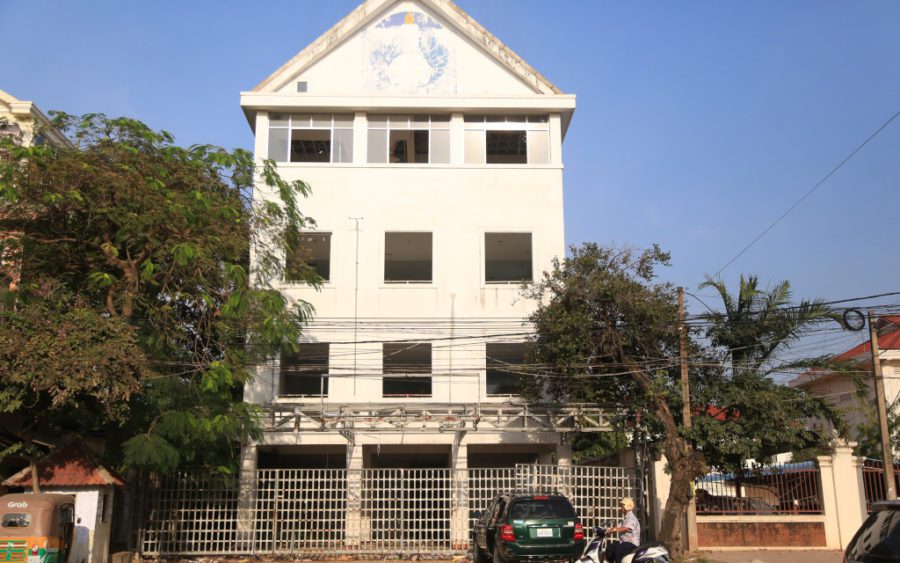Authorities claiming to be looking for weapons thwarted a small handful of supporters of the banned opposition CNRP from gathering outside the party’s former headquarters in Phnom Penh on Monday, the three-year anniversary of its dissolution.
Barricades and security checks were set up around the Meanchey district compound in the morning, leaving about half a dozen CNRP supporters who arrived to resort to merely drinking coffee nearby.
Sun Makara, a CNRP activist from Svay Rieng province, said he and others had come to commemorate the three-year anniversary of the party’s dissolution.
“[We] missed the past from before the party was dissolved,” Makara said.
A former commune councilor from the same province, who declined to be named for fear of repercussions, said he wanted to gather to show he was unhappy about the party’s dissolution.
“Some people from the province came and mourned,” he said. “But any taxi with multiple people in it, they stopped and questioned.”
He added that only a few people dared to come because they were worried of being arrested.
Lonh Sumsoma, a former party activist in Phnom Penh, later told VOD that he was followed home by men on motorbikes.
“We were just sitting and drinking coffee nearby, [and] they have to follow us to my house. I am not satisfied with the authorities actions,” Sunsoma said.
At about 8 p.m. on Monday, about 20 police officers in uniform were seen at the CNRP headquarters.
Dy Rath Khemrun, deputy governor of Meanchey district, said earlier that forces were deployed only to inspect for the weapons and “strengthen local security.”
“Nothing [else] was involved,” Rath Khemrun said, and declined to comment further.
Authorities on the scene told VOD journalists they were not allowed to photograph at the CNRP headquarters, following similar demands from police during an opposition protest near the Chinese Embassy on October 23, which saw three demonstrators arrested.
The CNRP headquarters building has become a dilapidated shell: Its sunrise logo is scrubbed and faded, and the glass windows of its empty halls are gone.
Mu Sochua, a CNRP vice-president who is living abroad to avoid arrest, said earlier on Monday that about 50 to 75 CNRP members were expected to gather to check court summonses for various CNRP leaders and supporters posted there.
Support for the disbanded party continues to face prosecution, however, and attempted rallies in the capital have withered to rarely more than a dozen protesters, outnumbered by police officers and other forces.
Defense lawyer Sam Sokong said that 67 more CNRP supporters had received court summonses over the weekend, bringing the total in recent months to nearly 200.
The most recent summonses, from the Phnom Penh Municipal Court, were to give testimony on November 26, alongside 59 other party members previously summoned to appear on the same day, Sokong said.
The cases were all for plotting and incitement related to supporting previous party campaigns, including showing support on Facebook, he said.
Dozens of other CNRP supporters have been summoned in the provinces of Banteay Meanchey, Battambang, Kampong Cham, Kampong Thom and Tbong Khmum.
“They are supporters and activists — the majority of them are elected former provincial, district and commune councilors,” he said.
“This is politically motivated,” Sokong added. “The court must be independent.”
The CNRP was dissolved in 2017 following controversial treason charges against its president, Kem Sokha. More than 5,000 elected councilors were removed from their positions, and the vast majority of the seats were transferred to the ruling party. The CPP now controls 96 percent of commune seats and 100 percent of National Assembly positions.
In a statement, the CNRP said Monday marked the third anniversary of the “death of democracy in Cambodia and its descent into dictatorship.”
On November 16, 2017, after more than 20 years of democratic and human rights development, “Cambodia reverted to one-party rule, reminiscent of the Khmer Rouge era of which Hun Sen and many senior CPP officials were part of,” the CNRP said.
The party also reiterated earlier demands: for the court to release and drop all charges against Sokha and other political prisoners, and for the government to restore respect for human rights and democracy.
The CNRP leadership in exile also vowed to return to Cambodia “in the nearest future” in order to “bring positive change” to the country.
Sin Rozeth, who was elected commune chief in Battambang province in 2017, had her position stripped the same year. She wrote on Monday reminding people that 5,007 CNRP commune councilors had been voted in amid a record voter turnout of more than 90 percent in 2017.
“That is why I believe the CNRP will return, and remain loyal to the people and the voters. For me, the CNRP is still in the hearts of all people,” Rozeth said in a Facebook post.
Sochua, the party vice president — who now lives in the U.S. — said that despite the mounting pressure on supporters in the country, keeping up civil resistance was key to the fight for political change.
“Silence is accepting to be victims and to give up in keeping democratic space,” she said.
The former lawmaker added that the party had “full respect for our members for their courage despite the pressure [and coercion] to defect” to the ruling CPP.
“We will continue to maintain our contact with [party] members inside the country,” she said.
Ruling party spokesperson Sok Eysan, however, said that three years on, he considered the CNRP to be dead.
“It was already dead, so it truly died and rotted into a monster and went to hell, and it is no longer on the earth,” Eysan said.
Additional reporting by Matt Surrusco












